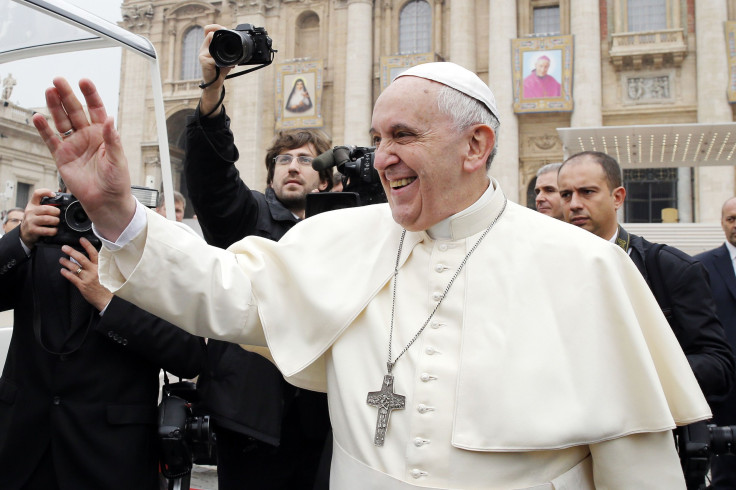Pope Francis Visits Turkey: Three Things To Know About The Papal Trip

Pope Francis will begin a three-day visit to Turkey on Friday. His trip will be the fourth bthat a pope has made to the nominally secular country with an overwhelmingly Muslim population.
Given the current climate in the Middle East, the trip may be a way to promote dialogue between Muslims and Christians, and in a nation next door to Syria and Iraq, where the Islamic State, a terror group also known as ISIS or ISIL, has declared a "caliphate.". The pope may also use the visit as a political opportunity to strengthen the Vatican’s ties with the Orthodox Church.
Here are answers to three common questions surrounding the pope’s upcoming visit:
What is the pope’s schedule?
According to a Vatican press release, the pope will start his trip in Ankara, the nation's capital, where he will be welcomed by Turkey’s president, Recep Tayyip Erdoğan, Prime Minister Ahmet Davutoğlu and Mehmet Görmez, the president of Religious Affairs and the highest placed Muslim cleric in the country.
The next two days will be spent in Istanbul, the country's largest city. First, the pope will visit the Hagia Sophia Museum – a domed complex that was once an Eastern Orthodox cathedral before becoming a mosque, and is now a museum. Francis will then visit the Blue Mosque and celebrate Mass at the Catholic Cathedral of the Holy Spirit. Afterwards he will offer an ecumenical prayer at the Patriarchal Church of St. George, followed by a private meeting with His Holiness Bartholomew I, the Istanbul-based leader of the Greek Orthodox Church. Francis will celebrate a private Mass on his last day, followed by a divine liturgy and the signing of a joint declaration with Bartholomew I.
The pope’s visit will coincide with the feast of St. Andrew, patron saint of the Ecumenical Patriarchate of Constantinople, on Sunday. Pope Benedict XVI and Pope John Paul II visited Turkey during this holiday as well.
Unlike past papal trips to Turkey, which involved numerous liturgies, audiences and speaking engagements, Francis will be giving just three public speeches, one of which includes a homily during Mass on his second day, the Catholic News Agency reports.
Why is Turkey considered an important visit?
The pontiff’s visit comes at a tumultuous time in the Middle East. Hundreds of thousands of Christians in Syria and and Iraq have fled their homeland in the last four years, with many seeking refugee in Turkey. Many of those refugees fled out of fear of the Islamic State.
Despite the unrest, Vatican spokesman Father Federico Lombardi told ANSA there are no specific safety concerns regarding Francis’ upcoming visit.
While it is not on his schedule, the pope might meet with Christian refugees during his visit to Turkey. Lombardi said some refugees may be present on Saturday when the pontiff will talk with students attending Catholic schools across the Middle East, the Catholic Herald reports.
Francis’ visit may also aim to make amends for something controversial his predecessor, Pope Benedict XVI, said. In 2006 the previous pope made a speech to an academic audience in Germany where he quoted a 14th century Christian emperor who said Muhammad brought only "evil and inhuman" things to the world. The speech was met with criticism by officials in Turkey and Pakistan, and Islamic activist groups.
Two months later, in an apparent attempt to repair the damage caused by the remarks, Benedict XVI visited Turkey. While he offered messages of reconciliation with Muslims worldwide, his visit was met by protesters who said the pontiff’s visit went against the secular beliefs outlined in the country’s constitution, the BBC reports.
Francis has taken strides to reconcile with the Muslim world as well. In the past he wrote that "authentic Islam and the proper reading of the Quran are opposed to every form of violence." In June, he hosted a joint prayer session with Israeli President Shimon Peres and Palestinian statesman Mahmoud Abbas. During his visit to Albania in September, Francis spoke at the country’s presidential palace emphasizing the country’s inter-religious government coalition that fosters a “climate of mutual respect” among different faith groups in Albania.
But Mehmet Görmez, the head of Turkey's Presidency for Religious Affairs, whom the pope will meet Friday, says the pontiff’s actions are not enough to resolve rising anti-Islam discrimination felt around the world.
"This won't be done by such things as washing a young girl's feet or arranging inter-religious soccer games," Gormez told the Catholic News Service, referring to two prominent acts the pope performed to promote interfaith peace.
What issues will Pope Francis address?
Besides promoting Christian and Muslim dialogue, the pope is expected to reinforce the relationship he has with Bartholomew I. While the two are already on friendly terms, this meeting comes after a Vatican official recently said the end of Communist rule was not completely positive for Christianity because it has created tensions between the Roman Catholic Church and the Russian Orthodox Church. That is, the re-emergence of Eastern rite Catholic churches, which the Kremlin suppressed until 1990, have been accused of wooing members of Russian Orthodox churches, according to Russian Orthodox leaders.
While the Vatican and Eastern rite Catholic churches deny these claims, Francis may attempt to use his trip to Turkey as an opportunity to ease tensions between Rome and Russia.
© Copyright IBTimes 2024. All rights reserved.






















